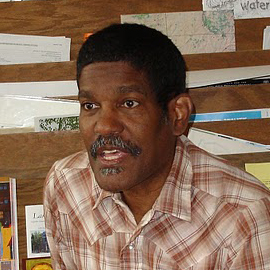
The Teff Connection
“It’s not just about Teff it’s about bridging Ethiopia with Nicodemus.”
– Edger Hicks, president of The Kansas Black Farmers Association.

(TsehaiNY) – Teff is an important food grain used to make injera, a staple in Ethiopian and Eritrean cuisine. The word teff derives from the Amharic word meaning lost (because of the small size of the grain) however, in Nicodemus, Kansas it is anything but.
The Kansas Black Farmers Association and The Solomon Valley Resource Conservation and Development Area Inc., will host Teff Field Day on August 5, 2010. Solomon Valley was awarded a three year grant from the U.S. Department of Agriculture in 2007. Speakers and producers alike will gather to share their experiences in growing the crop while the free lunch served will consist of food made from teff.
To find the reason behind the project to grow the main grain of Ethiopia in rural Kansas, one has to look no further than Nicodemus.
Nicodemus, Kansas was established by freed slaves in the 1800’s and is the oldest and only remaining all black town west of the Mississippi River. It’s also a community with a climate that presents several challenges for farmers including serious droughts and unstable commodity prices.
Teff appealed to the farmers because of its unique qualities, including its resistance to drought. The grain is also seen as a possible alternative crop with potential to become another source of revenue.
One of the main individuals involved in the project is Edger Hicks, president of The Kansas Black Farmers Association, whose passion for Ethiopia goes beyond the grain. Mr. Hicks has a keen interest in the history of Ethiopia and the freedom it represents. “When freed slaves first settled in Nicodemus, Kansas newspapers referred to them as almond-eyed Ethiopians and this was not in an endearing way.” He also sees a connection with Ethiopia and Nicodemus, citing their biblical references. “It’s not just about teff it’s about bridging Ethiopia with Nicodemus.”
Currently all the teff being produced in Nicodemus is used for forage, and fed to livestock such as horses and llamas. However, Mr. Hicks believes there is potential for producing teff in the U.S. market, in part because of its health benefits and also considering it’s a product which is already familiar to many. Citing a report from the New England Journal of Medicine he quickly highlights the nutritious value of teff especially the fact that it is gluten free. “People with Celiac Disease cannot tolerate gluten and teff could become alternative wheat for them.”
The process of growing teff for grain is met with challenges even for Kansas, the largest wheat growing state in the country. For starters, the tiny grain is not machine friendly. There is also the issue with weed control and harvesting management.
So, where do Nicodemus and the teff project go from here? Josh Coltrane, the project coordinator, admits that while the project is in its last year, no one is quite sure in the direction that it is headed. “Teff will continue to be grown here but the levels in which it will be grown is still uncertain. Nonetheless, this project has been educational and a great learning experience.”


Average Rating